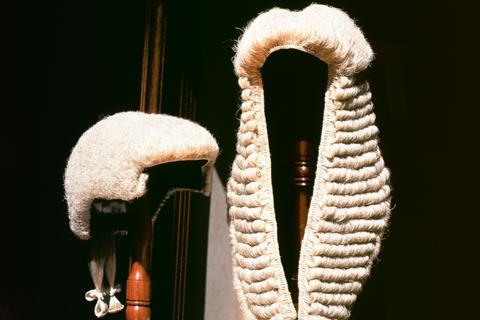The number of solicitor judges remains stubbornly flat despite efforts to boost diversity on the bench, official figures show. Solicitors remain less likely to be appointed than barristers and continue to constitute a smaller proportion of the judiciary than they did a decade ago.
According to annual diversity statistics released by the Ministry of Justice today, there were 1,062 solicitor judges in the courts on 1 April 2024, out of 3,667 in total. This compares with 1,068 and 1,055 respectively in 2023 and 2022.
Non-barristers remain very rare in the senior ranks, numbering just seven of 149 judges in the High Court and above.
For all legal judicial selection exercises in 2023-24, solicitors (52%) made up more applicants than barristers (29%), but constituted a smaller percentage of recommendations (32% compared with 40%).
Tribunal judges are twice as likely to have a non-barrister background as court judges.
Non-barristers (the vast majority solicitors) accounted for 31% of court judges in April 2024, down from 37% in 2014.

The statistics show no disparity in terms of sex and ethnicity in selection to judicial posts in terms of the eligible pool. Women represented 49% of the eligible pool and 53% of recommendations. Ethnic minority candidates accounted for 15% of the eligible pool and 16% of recommendations. For Asian candidates, the proportions were both 9% and for black candidates both 2%.
Aspiring judges from ethnic minorities are, however, less likely to be appointed because they apply in greater numbers.
The proportion of women court judges edged up to 38% from 37% last year, while the proportion of ethnic minority judges was unchanged at 10%.
Law Society president Nick Emmerson said: “Today’s figures show that there is still much work to do before the judiciary truly reflects society at large. Gradual improvement in the proportion of women judges and those from ethnic minority backgrounds have been concentrated at the lower end of the courts.
'Solicitors made up more than half of applicants yet less than a third of recommendations, while there has been no progress on Black representation on the bench in over a decade.'
He added: 'The number of non-barristers who hold the position of recorder stands at 8% and has barely risen over the last 11 years. Until this percentage significantly increases, the lack of solicitors holding senior judicial posts will continue.'
Sam Townend KC, chair of the Bar Council, welcomed the 'gradual progress being made', adding: 'We note that ethnic minority candidates continue to be more likely to apply and less likely to be recommended and this warrants further investigation by the Judicial Appointments Commission. We, therefore, welcome the lady chief justice’s commitment to focus on appointment of Black judges, as well as disabled judges, as a priority.
'Progression within a career at the bar of those from under-represented groups is a priority for the Bar Council.'
This article is now closed for comment.



























18 Readers' comments